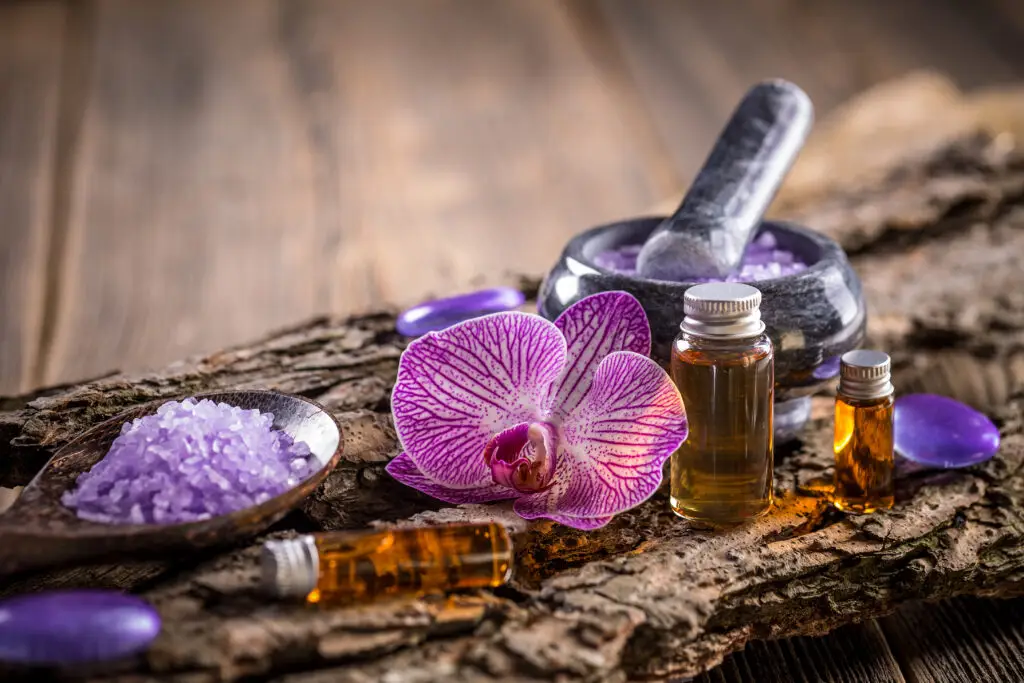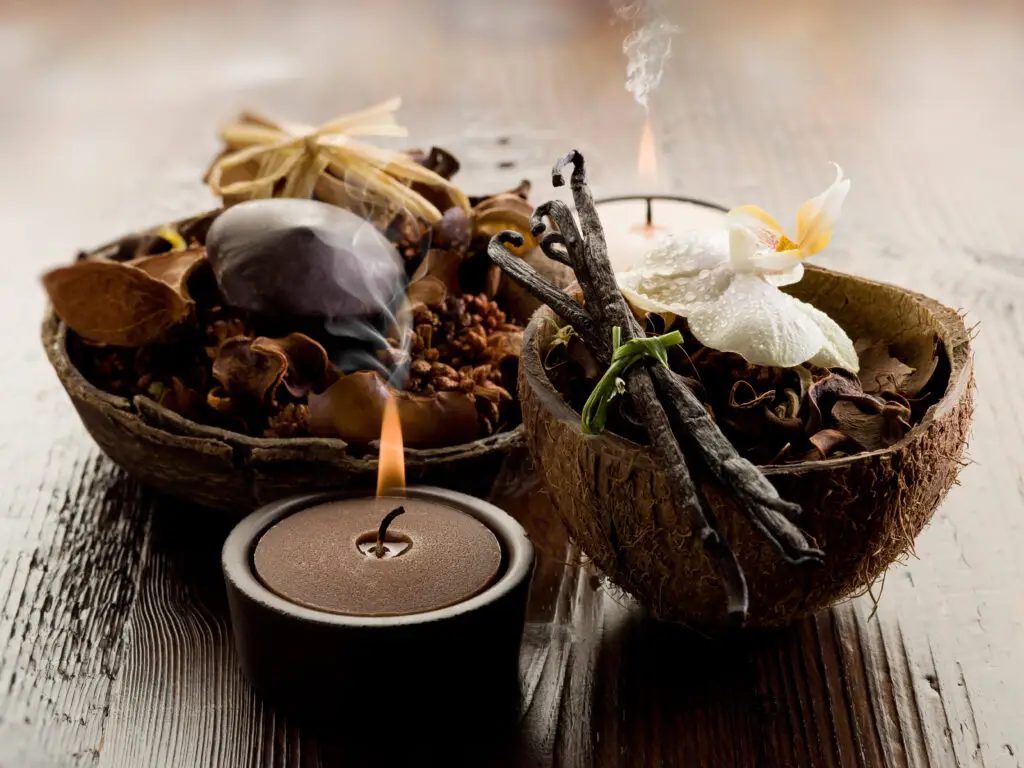Aromatherapy is an ancient practice that uses essential oils from plants to promote physical and emotional well-being.
Essential oils are concentrated substances that contain the aromatic compounds of plants. They can be used in various ways, such as:
- Inhalation: It is the most common way to use essential oils. They can be diffused into the air with a diffuser, or inhaled directly from the bottle.
- Topical application: They can be applied to the skin diluted in a carrier oil.
- Addition to bath products: They can be added to baths to create a relaxing experience.
History of aromatherapy
The origins of aromatherapy date back to the ancient civilizations, like the Egyptian, the Chinese and the Greek. In these cultures, essential oils were used for medicinal, spiritual and cosmetic purposes.
In the 20th century, aromatherapy developed as a modern practice thanks to the work of French chemist René-Maurice Gattefossé.
Gattefossé discovered the healing properties of essential oils when he burned his hand and immersed it in a container of lavender oil.
Benefits of aromatherapy
Aromatherapy has been used to treat a wide range of conditions, such as:
- Stress.
- Anxiety.
- Insomnia.
- Headaches.
- Respiratory problems.
- Digestive problems.
- Skin problems.
- Muscle pains.
The 10 Best Essential Oils for Aromatherapy
- Lavender: Known for its relaxing properties, it helps reduce stress, anxiety and insomnia.
- Mint: Helps improve concentration and memory. It is also effective in relieving headaches and nausea.
- Orange: citrus and revitalizing, helps improve mood and energy.
- Eucalyptus: with decongestant properties, it helps relieve respiratory problems.
- Chamomile: calming that helps reduce anxiety and stress.
- Lemon: refreshing and purifying, it is used to help improve concentration and memory.
- Bergamot: Its main use is to reduce stress and anxiety.
- Tea tree- Acts as an antibacterial and antifungal, which helps treat skin problems such as acne and psoriasis.
How to incorporate aromatherapy into your daily life
Aromatherapy is a simple and effective way to improve your physical and emotional well-being. Here are some ideas to incorporate it in your daily life:
- Use a diffuser in your home to create a relaxing and harmonious environment.
- Add a few drops of your favorite essential oil to your bath for a relaxing and revitalizing experience.
- Inhale your favorite essential oil during meditation or yoga to deepen your experience.
- Apply your favorite essential oil topically to treat skin problems or muscle pain.
Experiment with different essential oils and combinations to find what works best for you. Aromatherapy is a personal and unique practice, so don't be afraid to experiment.
Aromatherapy is an ancient practice that has much to offer. It is a simple and effective way to improve your physical and emotional well-being. Experiment with different essential oils and combinations to find what works best for you.
Essential oils and their properties
At the beginning of the post we read an introduction to aromatherapy and the general benefits of essential oils. In this section we are going to delve into the properties and benefits specific to each essential oil.

Lavender
Lavender is the most popular essential oil known for its relaxing properties. Helps reduce stress, anxiety and insomnia. It has also been shown to have anti-inflammatory, antibacterial and antifungal properties.
Properties:
- Relaxing
- Anti-inflammatory
- Antibacterial
- Antifungal
Benefits:
- Reduces stress and anxiety
- It enhances sleep quality
- Relieves muscle pain
- Healing wounds
- Treat acne
- Prevents dandruff
Applications:
- Diffusion
- Inhalation
- Topical application
How to use lavender:
- To reduce stress and anxiety, diffuse lavender around your home or inhale directly from the bottle.
- To improve sleep quality, add a few drops of lavender to your pillow or bath.
- To relieve muscle pain, apply lavender diluted in a carrier oil to the affected area.
- To heal wounds, apply lavender diluted in a carrier oil to the wound.
- To treat acne, apply lavender diluted in a carrier oil to the affected area.
- To prevent dandruff, add a few drops of lavender to your shampoo or conditioner.
Precautions:
- Avoid direct exposure to sunlight after applying lavender to your skin.
- If you are pregnant or breastfeeding, consult your doctor before using lavender.
Mint
Peppermint is a stimulating essential oil that helps improve concentration and memory. It is also effective in relieving headaches and nausea.
Properties:
- Stimulating
- Painkiller
- Antispasmodic
- Anti-inflammatory
Benefits:
- Improves concentration and memory
- Relieves headaches
- Relieves nausea
- Reduce congestion
- Improves digestion
- Relieves muscle pain
Applications:
- Diffusion
- Inhalation
- Topical application
How to use mint:
- To improve concentration and memory, diffuse peppermint around your home or inhale directly from the bottle.
- To relieve headaches, apply peppermint diluted in a carrier oil to your forehead or temples.
- To relieve nausea, inhale peppermint directly from the bottle or add a few drops to a tissue.
- To reduce congestion, add a few drops of peppermint to a diffuser or inhale directly from the bottle.
- To improve digestion, add a few drops of mint to your water or food.
- To relieve muscle pain, apply peppermint diluted in a carrier oil to the affected area.
Precautions:
- Avoid using mint if you have high blood pressure or heart problems.
- If you are pregnant or breastfeeding, consult your doctor before using mint.
Orange
Orange is a citrus and revitalizing essential oil that helps improve mood and energy.
Properties:
- Revitalizing
- Relaxing
- Antidepressant
- Anti-inflammatory
Benefits:
- Improves mood
- Increases energy
- Reduces stress and anxiety
- Relieves depression
- Reduces inflammation
Applications:
- Diffusion
- Inhalation
- Topical application
How to use orange:
- To improve mood and increase energy, diffuse orange throughout your home or inhale directly from the bottle.
- To reduce stress and anxiety, add a few drops of orange to your pillow or bath.
- To relieve depression, diffuse orange around your home or inhale directly from the bottle.
- To reduce inflammation, apply orange diluted in a carrier oil to the affected area.
Precautions:
- Avoid using orange if you have high blood pressure or heart problems.
- If you are pregnant or breastfeeding, consult your doctor before using orange.
Eucalyptus
Eucalyptus is a decongestant essential oil that helps relieve respiratory problems.
Properties:
- Decongestant
- Anti-inflammatory
- Expectorant
Benefits:
- Relieves nasal congestion
- Relieves cough
- Reduces inflammation of the airways
Applications:
- Diffusion
- Inhalation
- Topical application
How to use eucalyptus:
- To relieve nasal congestion, diffuse eucalyptus around your home or inhale directly from the bottle.
- To relieve cough, add a few drops of eucalyptus to a diffuser or inhale directly from the bottle.
- To reduce airway inflammation, apply eucalyptus diluted in a carrier oil to your chest or back.
Precautions:
- Avoid using eucalyptus if you have high blood pressure or heart problems.
- If you are pregnant or breastfeeding, consult your doctor before using eucalyptus.
Chamomile
Chamomile is a calming essential oil that helps reduce anxiety and stress.
Properties:
- Pain relieving
- Anti-inflammatory
- Antispasmodic
Benefits:
- Reduces anxiety and stress
- It enhances sleep quality
- Relieves menstrual pain
- Reduces inflammation
Applications:
- Diffusion
- Inhalation
- Topical application
How to use chamomile:
- To reduce anxiety and stress, diffuse chamomile around your home or inhale directly from the bottle.
- To improve sleep quality, add a few drops of chamomile to your pillow or bath.
- To relieve menstrual pain, apply chamomile diluted in a carrier oil to your abdomen.
- To reduce inflammation, apply chamomile diluted in a carrier oil to the affected area.
Precautions:
- Avoid using chamomile if you are allergic to daisy pollen.
- If you are pregnant or breastfeeding, consult your doctor before using chamomile.
Lemon
Lemon is a refreshing and purifying essential oil that helps improve concentration and memory.
Properties:
- Refreshing
- Purifying
- Antiseptic
- Antibacterial
Benefits:
- Improves concentration and memory
- Relieves headaches
- Reduces anxiety and stress
- Purifies the air
- Disinfect surfaces
Applications:
- Diffusion
- Inhalation
- Topical application
How to use lemon:
- To improve concentration and memory, diffuse lemon around your home or inhale directly from the bottle.
- To relieve headaches, apply lemon diluted in a carrier oil to your forehead or temples.
- To reduce anxiety and stress, diffuse lemon around your home or inhale directly from the bottle.
- To purify the air, diffuse lemon in your home.
- To disinfect surfaces, add a few drops of lemon to a damp cloth.
Precautions:
- Avoid using lemon if you have a sensitivity to citrus.
- If you are pregnant or breastfeeding, consult your doctor before using lemon.
Bergamot
Bergamot is a citrus and relaxing essential oil that helps reduce stress and anxiety.
Properties:
- Relaxing
- Antidepressant
- Anti-inflammatory
Benefits:
- Reduces stress and anxiety
- Relieves depression
- Reduces inflammation
Applications:
- Diffusion
- Inhalation
- Topical application
How to use bergamot:
- To reduce stress and anxiety, diffuse bergamot around your home or inhale directly from the bottle.
- To relieve depression, diffuse bergamot around your home or inhale directly from the bottle.
- To reduce inflammation, apply bergamot diluted in a carrier oil to the affected area.
Precautions:
- Avoid using bergamot if you have a sensitivity to citrus fruits.
- If you are pregnant or breastfeeding, consult your doctor before using bergamot.
Tea tree
Tea tree is an antibacterial and antifungal essential oil that helps treat skin problems such as acne and psoriasis.
Properties:
- Antibacterial
- Antifungal
- Antiseptic
- Healing
Benefits:
- Treat acne
- Treats psoriasis
- Healing wounds
- Disinfect surfaces
Applications:
- Diffusion
- Inhalation
- Topical application
How to use tea tree:
- To treat acne, apply tea tree diluted in a carrier oil to the affected areas.
- To treat psoriasis, apply tea tree diluted in a carrier oil to the affected areas.
- To heal wounds, apply tea tree diluted in a carrier oil to the wound.
- To disinfect surfaces, add a few drops of tea tree to a damp cloth.
Precautions:
- Avoid using tea tree if you have sensitive skin or if you are pregnant or breastfeeding.
This is everything we wanted to tell you about essential oils.
In this article, we have seen the properties and benefits of the 7 most popular essential oils. These essential oils can be used in various ways, such as:
- Diffusion: It is the most common way to use essential oils. They can be diffused into the air with a diffuser.
- Inhalation: They can be inhaled directly from the bottle or added a few drops to a tissue.
- Topical application: They can be applied to the skin diluted in a carrier oil.
It is important to consult with a health professional before using essential oils, especially if you have any health problems.




